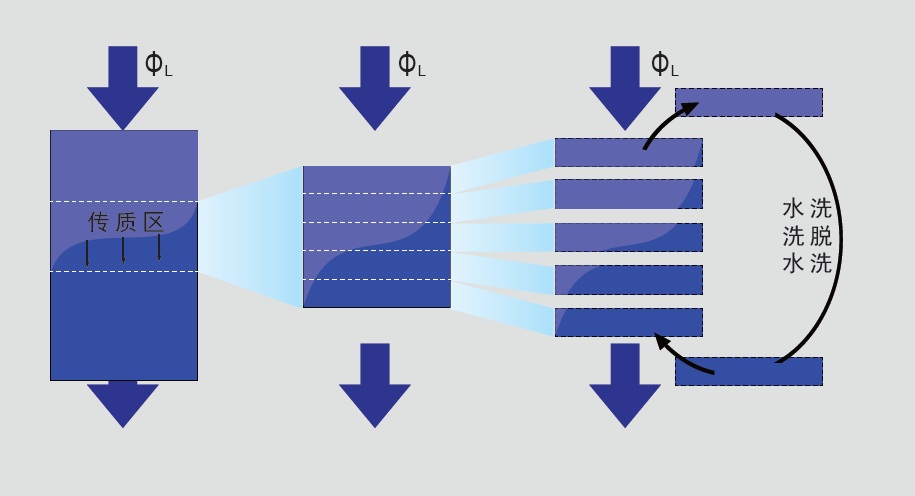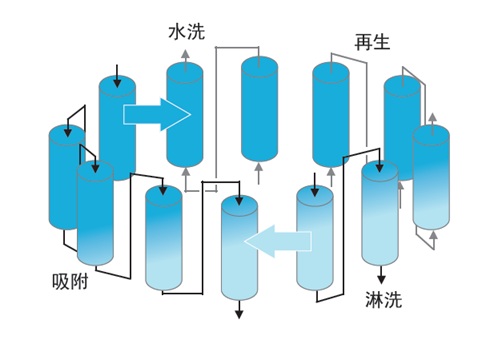Continuous ion exchange theory:
Ion exchange technology, based on the resin functional groups and materials in the adsorption of specific ions is carried out by the exchange process. Ion exchange is a reversible equivalent exchange reaction. Traditional ion exchange is achieved by the application of a fixed bed, which will be divided into three sections, saturation zone, active area (mass transfer area) and fresh resin area. As the exchange progresses, the mass transfer zone continues to move down until the bottom exchange is complete. Only the mass transfer zone is in working condition all through the entire process while saturated area and fresh resin area not. So, the resin utilization rate is low. In order to improve the utilization of the resin, the mass transfer zone is divided into several small units. Once the small units are saturated, they are removed for washing and regeneration. The fresh resin units for processing will return to the bottom of the mass transfer zone for recycling, so as to improve the utilization of resin.

In order to achieve the automatic and efficient operation of the resin unit, we have adopted a new design concept that the resin column small unit are put on a turntable, switch is achieved through the turntable rotation, and the material is distributed through an automatic rotation control. The resin column is divided into exchange, washing, regeneration, rinsing and other functional areas. When the resin unit reaches the specified area to implement the appropriate process, each process can be carried out independently to make the overall process operation continuously.
 Advantages of continuous ion exchange:
Advantages of continuous ion exchange:
Integrate all the steps that can run continuously and systemically;
Significantly reduce the use of resin, and make full use of resin;
Extend working life of resin;
Reduce water and chemical consumption as well as operating costs and sewage emissions;
Can remove or separate the material with different characteristics, and can simplify the process;
Maintain the stability of the product composition and concentration in the feed liquid
Can effectively improve the purity and concentration of product liquid, saving the cost of follow-up technology
The use of multi-column system can be flexible to change the production process;
Compact, small area needed, and easy to install in any location;
Fully automated programmed operation control ensures continuous and stable operation of the equipment;
Rotation speed and flow rate can be adjusted.
Continuous ion exchange Typical applications:
Conversion of Sodium gulonate to gulonic acid
Conversion of Vc-Na to Vc
Lysine extraction
Erythromycin extraction
Glutamine extraction
Extraction of colchicine sulfate
Extraction of sodium salt
Glucose is grayed out
Sorbitol
Tryptophan refining
Threonine
Glutamic acid refining
Aspirin Refined
Ribose desalination
Lactate desalination
Citrate desalination
Gulanic acid desalination
Citric acid decolorization
Potassium sulfate production
Potassium nitrate production
Plutonium purification
Nicotinamide recovery
Metal gallium recovery
Recovery of uranium in phosphoric acid
Recycling of waste water
Lithium recovery (rare earth)
Recovery of metal in brine
Recovery of fluoride in waste water
Waste water in addition to zinc
Protein Separation in cheese whey
Removal of copper-vanadium catalyst from adipic acid
Succinic acid to remove copper/alum
Removal of iron from copper electrolytes
Contact:
Tel:+86 592 6514970
Email:market@guochukeji.com
Skype:18060902001
WhatsApp:18060902001
WeChat:18060902001
TM: guochukeji
QQ:1641011431



